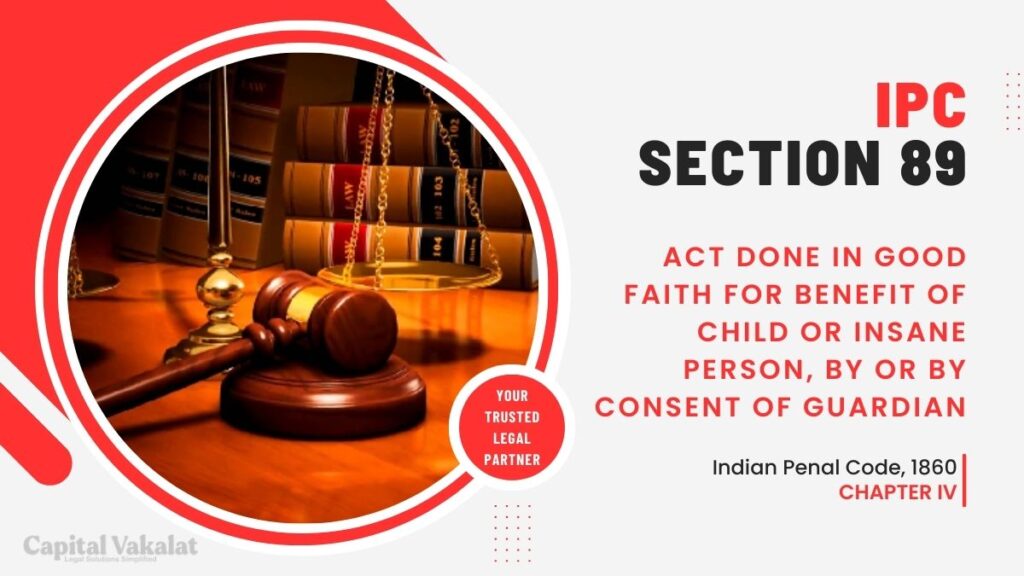In the realm of Indian Penal Code (IPC), Section 89 stands as a beacon of compassion and legal protection for acts carried out in good faith for the welfare of a child or an insane person, with the guardian’s consent. This provision, often overlooked, plays a vital role in safeguarding the interests of those who cannot safeguard themselves.

In this comprehensive article, we delve into the nuances of Section 89 IPC, exploring its provisions, implications, and relevance in contemporary society.
Introduction to Section 89 IPC
Section 89 of the Indian Penal Code, enacted during the British colonial era, addresses situations where a person acts in good faith for the benefit of a child or an insane person with the guardian’s consent. It recognizes the importance of safeguarding the welfare of vulnerable individuals.
Understanding ‘Acts Done in Good Faith’
To fall under the purview of Section 89 IPC, the actions taken must be carried out in “good faith.” This implies that the individual’s intentions must be noble and devoid of malice or ill-will. Good faith acts as a protective shield against wrongful accusations.
The Beneficiaries: Children and Insane Persons
Section 89 primarily focuses on the well-being of children and insane individuals. It recognizes their inability to make informed decisions and seeks to ensure that actions taken on their behalf are genuinely beneficial.
Guardian’s Consent: A Crucial Element
For an action to be protected under Section 89, it must have the consent of the guardian. This emphasizes the importance of the guardian’s role in safeguarding the interests of the child or insane person.
Legal Implications of Section 89 IPC
Understanding the legal consequences of Section 89 is essential. It shields individuals from legal repercussions if their actions meet the criteria of the provision.
Challenges and Interpretations
Like any legal provision, Section 89 IPC has faced challenges and varying interpretations in different cases. We explore some of these interpretations and their implications.
Contemporary Relevance
In today’s society, where the welfare of children and mentally challenged individuals is of paramount importance, Section 89 IPC continues to be highly relevant.
Cases and Precedents
We delve into some notable cases and legal precedents where Section 89 IPC played a pivotal role in ensuring justice and protecting the vulnerable.
Humanitarian Approach of the Law
Section 89 reflects a humanitarian approach, highlighting the importance of compassion and empathy in the legal system.
Balancing Act: Rights vs. Welfare
The provision prompts a debate on striking the right balance between individual rights and the collective welfare of society’s most vulnerable members.
Section 89 IPC and Medical Treatment
One significant aspect of Section 89 involves medical treatment. We discuss how this provision affects medical decisions made on behalf of children or insane individuals.
Ethical Considerations
The ethical dimensions of Section 89 are explored, shedding light on the moral obligations that guide individuals and guardians.
Legal Safeguards for Guardians
Guardians, who play a pivotal role in the application of Section 89, have certain legal safeguards and responsibilities. We examine these in detail.
Awareness and Advocacy
Creating awareness about Section 89 IPC and advocating for its responsible use are essential steps in ensuring its efficacy.
Conclusion
In conclusion, Section 89 IPC serves as a legal bastion protecting the interests of children and insane persons. It upholds the principles of good faith, compassion, and responsibility. As society evolves, so too does the relevance and importance of this provision.
FAQs
Can acts done in good faith still be challenged legally?
Yes, even if done in good faith, actions under Section 89 IPC can face legal challenges if they do not meet the criteria specified in the provision.
How does Section 89 IPC impact medical decisions for children and insane individuals?
Section 89 IPC provides a legal framework for making medical decisions on behalf of vulnerable individuals, emphasizing their welfare.
Are there any notable cases where Section 89 IPC played a crucial role?
Yes, there are several cases and legal precedents where Section 89 IPC was instrumental in ensuring justice and safeguarding the interests of the vulnerable.
What should guardians be aware of when making decisions under Section 89 IPC?
Guardians should be aware of their legal responsibilities and the ethical considerations involved in making decisions on behalf of children or insane individuals.